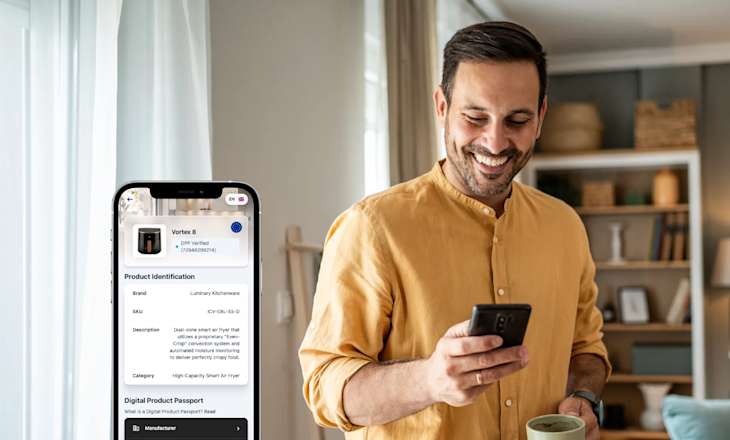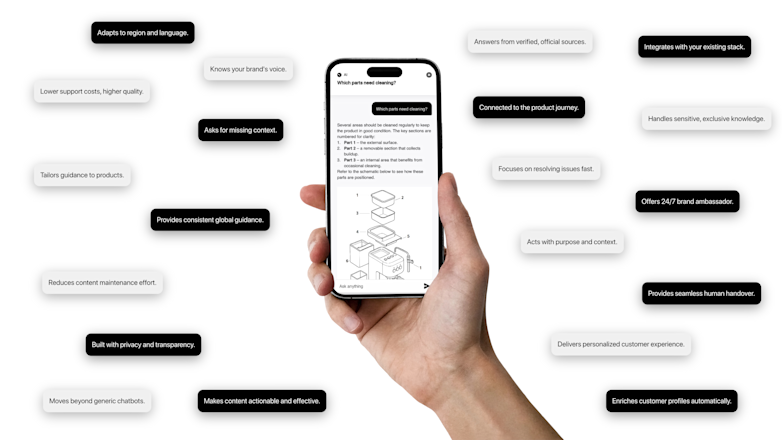
The days of single-channel marketing are over. Today, the technology we use for marketing is developing rapidly. Things that may have seemed impossible a few years ago, like artificial intelligence and machine learning-driven campaigns, are becoming mainstream now.
Business marketers now have access to multiple contact points to reach out to their audience throughout the user journey. Customers expect brands to implement an omnichannel marketing campaign and offer them a smooth and enjoyable experience.
However, with so many options, sometimes we can overlook the most basic yet effective technique of all: SMS marketing. Although SMS marketing may seem old-fashioned to reach out to your customers, it is not. It can be an efficient channel to complement social media marketing or email marketing.
Since text messages prominently display themselves through notifications, you can be assured that your customer's phones will beep and they will receive the alert. This way, your campaign won't go unnoticed. This is why SMS marketing can be even more successful than email or social media marketing.
However, SMS marketing has the potential to become annoying if not used correctly. In this blog, we will tell you how you can leverage this technology to create a successful campaign.
What is SMS marketing?
SMS marketing is a technique that allows companies to text messages to clients. It refers to employing text messaging for commercial purposes to send transactional or promotional campaigns (SMS).
The primary purpose of these messages is to inform customers who have opted in to receive text messages from your company about time-sensitive deals, updates, alerts, and so on.
In recent years, customers are getting more accustomed to communicating with brands via mobile devices. They frequently anticipate being able to text or message brands at their convenience.
It should be no surprise that more than half of US merchants had expected to boost their digital marketing spending in messaging and SMS in January 2020. It was before the COVID-19 pandemic drastically changed how businesses connect with their customers. By June 2020, that percentage had risen to 56%, outpacing all other possible investment areas in retail marketing.
A similar study by Juniper Research also found that there were 2.7 trillion mobile business messages sent globally in 2020, an increase of 10% from 2019. 98% of that messaging traffic was SMS, and 408 billion of those messages were sent by businesses in the retail industry.
Why is SMS marketing so popular?
Text messages, along with email, WhatsApp, and push alerts, give you a direct line of communication. Thus, when done correctly, text message marketing is one of the most successful ways to reach customers. According to Gartner, 80% of customer support firms will switch from using native apps to SMS and messaging by 2025.
Together with SMS marketing, SMS customer service is also taking hold in numerous industries. It refers to providing services and support to customers via SMS texts. Customers can now "speak" to customer service representatives by text messages.
Customers consider service SMS messages as the most beneficial ones sent by brands. Customers prefer appointment reminders, delivery status updates, and booking confirmations SMS over product or service discounts. These are all important pieces of information, hence customers are happy to get notified by companies.
Of course, automated confirmations and reminders are just one aspect of SMS customer care. It also entails enabling one-on-one text chats between clients and customer service representatives.
All things considered, it makes sense to integrate SMS customer service if you intend to use text message marketing. Customers who perceive genuine value in the messages you send are more likely to remain SMS subscribers.
Let’s dive deeper into the different types of SMS marketing.
Types of SMS marketing
Before we get into the benefits of SMS marketing, let's look at the different types of SMS marketing:
Alerts and notifications
A wide range of alerts and notifications can be issued by SMS marketing. These include regular company updates about business hours, special events at the company, new products, and service launches, restock alerts, sales, and even emergency alerts.
When sending alerts and notifications, the template that is usually used is a brief message along with a shortened URL, which leads customers to the main web page that contains the entire information.

Flash sales
A flash sale is a brief campaign, lasting between two and forty-eight hours, inducing buyers to purchase additional products or services related to what they have already purchased. This is also a marketing technique that allows you to create a sense of urgency and helps increase sales.
In these kinds of messages, it is usually mentioned a timeline of the sale and the amount of inventory that is left-and provides the URL to the product(s) in question.
Loyalty Programs
When special "milestones" are completed, free products or various discounts are awarded to the customers. Loyalty programs are created to motivate customers to repurchase or activate word-of-mouth.
Loyalty programs work wonders at fostering relationships over time. Clients feel valued by the exclusive treatment and offers they receive and consequently spend more time and money on the brand.
SMS coupons
SMS discounts are commonly distributed through the Multimedia Messaging Service, or MMS. These texts feature a discount on a product or service by the brand from which the customer signed up to receive SMS marketing messages.
SMS vouchers typically have an extended expiration date. Many businesses will make these more appealing to clients by adding aesthetically appealing images and QR codes that can be quickly scanned. These types of communications are valuable in driving traffic and increasing online sales.
Promotional discounts and deals
SMS messages promoting sales and discounts are one of the most popular forms of marketing. These are notifications about special sales, bargains, and discounts. Compared to flash sales, they are active for a longer period of time.
SMS marketing vs. other marketing tools
Apart from SMS marketing, there are other techniques for reaching out and creating a bond with customers. The world of marketing is constantly changing, and what was successful one year might not be successful the following one.
Email marketing has been the most incredible and easiest method of reaching a large audience for several years. As a result, corporate marketers have consistently favored it. However, times are always changing, and SMS marketing is quickly overtaking all other forms of advertising.
To reach prospective clients, businesses frequently combine SMS and email marketing. You can maximize the advantages of each path by combining them. Each route offers a distinct set of benefits. With a hybrid approach, you can send long-form emails and short-form messages to keep your customers constantly updated.
For instance, you can provide customers with lengthier, multimedia-rich information via email marketing. It's a fantastic approach to keeping clients informed about what your brand is doing. On the other hand, SMS texts are ideal for conveying timely information like delivery tracking details or advertising a flash sale.
Now, let’s look at some of the benefits of SMS marketing.
Benefits of SMS marketing
Like every other digital marketing channel, SMS marketing has pros and cons. Here are some data-backed benefits of SMS marketing:
1. Customers open text messages
In 2021, more than 85% of US adults owned a smartphone, making SMS an effective method for immediately contacting customers. While SMS marketing has an average open rate of 82%, general SMS messages have a 98% open rate. Customers also take action through SMSs, so it is interesting to know that messages with URLs have an average click-through rate of 36% (CTR).
A text is opened by 83% of millennials within 90 seconds of getting it. Text messages are the quickest, most reliable way to communicate an urgent message or promotion. SMS marketing campaigns will boost sales immediately and contribute to your overall success.
2. Text messages are an opt-in channel
Unlike sponsored content or pay-per-click (PPC) adverts, SMS is a compliant form of marketing. Customers should disclose their phone numbers to allow companies to send them messages. When important notifications are sent through text messages, customers are incentivized to give their personal phone numbers. As SMS text can be defined as an opt-in channel, customers will be more likely to read your messages and take action accordingly.
3. Customers find SMS marketing suitable
91% of consumers are interested in signing up to receive text messages from companies. SMS marketing is a good channel to use to communicate with customers, especially because they want to use SMS for buying as well. Compared to 2019, a higher number of consumers (almost 66%) signed up to receive texts from more companies in 2020.
4. Text messages are perceived as valuable
SMS builds confidence since clients demand immediate order updates. SMS gets delivered and notified right away, unlike emails. Simple, quick, vital, relevant notifications are exactly what customers expect from companies nowadays. Many consumers have a promotional email they never check. Some people disable email alerts. But they always receive and read SMS messages.
While updates and reminders are the messages customers value the most, discounts are the third-most valued SMS message type.
5. It completes the email marketing loop
Even though email and SMS marketing strategies are very similar, they are most effective when used in tandem. As we already discussed, you can use SMS to provide immediate notifications, whereas email is better suited for longer-form information, like a newsletter with helpful links.
6. SMS marketing has high engagement rates
SMS engagement rates are astronomical compared to email, with 90% of messages being read within 3 minutes of delivery. Because of this, SMS is particularly effective at transmitting important information.
7. SMS marketing can be personalized
SMS is a personal method of communication. According to Twilio's State of Customer Engagement 2022 survey, 98% of businesses and 83% of consumers feel that personalization boosts customer engagement.
Things to consider when using SMS marketing
Here are some of the things you should take into consideration when using SMS marketing:
1. Text messages need to be concise
There is a 160-character limit on text messages. You will need to pay for extra characters if you want them to be longer. And even if you could write more, customers expect brief texts. Your marketing message would probably be better served as an email or social media post if you can't fit it in 160 characters.
Therefore, instead of promoting the overall great value you provide, use SMS only to highlight a single promotion or deal.
2. It has less frequency
The average person only sends about 15 texts daily, compared to 56% of consumers who receive between 25 and more than 100 emails daily. You won't be able to send SMS messages to your contact list as frequently as you can send emails or make Instagram posts. Text messages should be sent only when relevant information has to be communicated to the customers.
3. The SMS channel needs to be consistently handled
Without a strategy, you can't simply dive into text message marketing at random. You will need to manage this channel carefully and proactively. It requires consistency, responsiveness, and strategic thinking. It will take time and resources to handle this additional channel, but there are some best practices that will make it easier.
SMS marketing best practices
1. Give your customers the option to unsubscribe
This is a recommended practice for all marketing communications and is usually required by law. However, it's crucial for a more intrusive means like SMS. People who don't want to hear from you are more likely to unsubscribe from your texts than to buy from you.
You should include an unsubscribe link even for transactional notifications like shipping updates or appointment reminders. Not everyone wants to get this kind of information by SMS.
2. Send messages at the right moment
People open text messages nearly instantly, unlike email and social media. Even though this is excellent for urgent communications, you shouldn't abuse this ability by bothering contacts at unusual times of the day.
Would you want to use a coupon that just woke you up at two in the morning on a Wednesday? Not really. In fact, some countries have regulations governing the timing of text message marketing (e.g., EU nations like France do not allow SMS marketing on Sundays, holidays, or anytime after 10 PM).
3. Mention your brand
You can't just assume that your clients know your SMS contact information. It implies that they won't recognize the number from which your communication is coming if it contains no inherent identifying information.
Introduce yourself immediately if you want them to read past the first few words. Thus, you must first disclose to your contacts the issuer of the message. Put your brand name right at the beginning message to achieve this.
4. Add a Call To Action
Encourage customers to take the next action, just like other marketing messages. What do you want your customers to do? Check out your website? Come to a product launch event? Always end your notifications with a CTA.
Any marketing campaign needs a compelling CTA. A call-to-action motivates visitors to proceed and advances them through the buyer's journey. Since they cannot read your thoughts, your customers must be told what to do.
You can easily include phrases like these in your SMS marketing campaigns to include a CTA:
Sign up for free!
Click the link below to check all the products on sale!
Use this 20% off code while checking out!
Fill out the survey for a chance to win!
5. Be aware of your character count
160 characters are the maximum for SMS messages. When you have to identify yourself and give an opt-out option, that's not much to work with. Thus, you must avoid wasting any characters and keep your message relevant to customers.
SMS marketing can be an effective way to personally connect with your clients by sending personalized and timely alerts. If used correctly, it can significantly benefit your brand. Take into consideration these best practices when opening this new communication channel.
How Layerise can help you with your SMS marketing strategy
To design an effective SMS marketing campaign, consider adopting Layerise solution. Layerise helps you collect relevant first-party data about your customers to create a personalized user experience. Thanks to the collected information, you can then build automated marketing campaigns based on your target demographic. Brands can create personalized text messages, add CTA, and make them relevant to increase conversions.
Layerise helps brands design intelligent and savvy campaigns that can drastically lower your unsubscribe rate. By combining CRM and marketing capabilities, Layerise helps brands forge long-lasting relationships with their customers and generate recurring revenue.
Book a free demo today to learn more about how Layerise can help you with your SMS marketing strategy.
Learn how to collect valuable insights on your customers to sell even more.

How to Turn a New Obligation into a Growth with Layerise

A trusted, brand-safe AI assistant that knows your products, your customers and your content.


